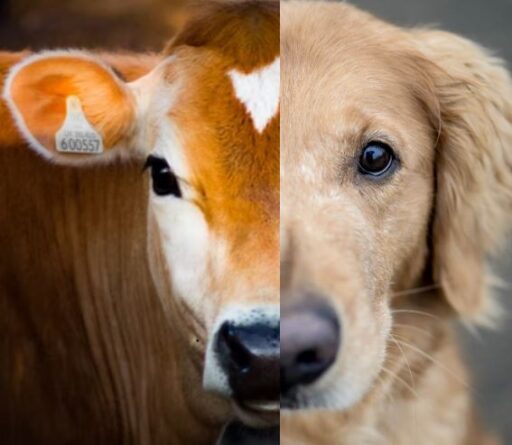If you’re like most people, you might think that cows just make milk and need to be milked. But that is a marketing façade used to cover the cruelty in the life of a dairy cow.
Cows are like human females in that they only lactate after giving birth. So, to make them give milk, workers artificially inseminate them. They put a hand up the cow’s vagina with forcibly taken bull sperm. When the cow gives birth, farmers typically take her baby away in under a day. They then hook the mother up to machines to sell the milk that her body made for her baby. Farmers then castrate the calves and remove their horns without anesthetic. Male calves are either killed at birth or sold to the veal or beef industry. Female calves are raised for the same cycle.
- Physical pain
- Emotional and cognitive distress
- Abuse is the industry norm
- What matters is what we have in common
- What about local milk from small farms?
- Is “animal welfare” enough?
- The fight against all injustice is one fight
- The dairy industry shows our egocentrism
- Love and compassion guide us to positive change
Physical pain
Through selective breeding, antibiotics and hormones, modern day cows now produce about 10 times the amount of milk they previously did. As a result, they suffer from more mastitis (inflammation of the udder), lameness, susceptibility to disease and decreased lifespan.
Emotional and cognitive distress
Beyond physical suffering, there is great emotional and cognitive distress in the life of a dairy cow. Researchers have proven this with objective measures. When afraid, they resist entering, defecate, cry out and attempt to escape. Their heart beats speed up and the whites of their eyes show more. Their nasal temperatures and ear postures drop.
Abuse is the industry norm
Abuses such as these are inextricable from the industry. But beyond this embedded violence, many undercover investigations have found other widespread abuses. Undercover footage has shown workers kicking cows, beating them with medal rods and using tractors to drag them by an ankle. Workers often resort to this abuse to force cows to move into milking stalls. Despite rampant violence, no one outside the dairy industry monitors its treatment of the animals. Thus, profit dictates industry standards, not the animals’ welfare.
Each time this happens, the industry claims these are isolated cases. Yet it isn’t just “a few bad apples.” Evidence of abuse has surfaced from dairy farms all around the U.S. and the world, such as the United Kingdom, Australia, New Zealand, Germany, Brazil, Wales, New Mexico farms supplying Publix, Texas farms supplying Target and Costco, New York, California, Indiana, Pennsylvania, Ohio, North Carolina, Florida, and Wisconsin.
How many cases does it take before we realize that the system facilitates animal abuse by workers, even if it doesn’t explicitly condone it?
Cows naturally live about 20 years, but their bodies are so abused that their milk-producing abilities last only four to five years. At this point, the industry sends them to be slaughtered for beef. So, dairy an exploitative system that is part and parcel with the meat industry. Arguably, dairy is even worse than meat because a cow suffers its entire life before slaughter. This is how all cow’s milk across the world reaches the grocery aisle.
What matters is what we have in common
When we consider what cows have in common with our companion animals and even with ourselves, this cruelty is gut-wrenching. Most importantly, cows feel physical and emotional pain. Beyond these basics, they are like us and other mammals in many ways. They like to play by pushing balls, running, galloping, bucking, play-fighting and social licking. They even have individual personalities, complex cognition and friends.
What about local milk from small farms?
You may wonder, “What if I get milk products from a small, local farm where calves are allowed to remain with their mothers for several months? What’s the problem with drinking milk that the calf doesn’t need?”
Despite the fact that some smaller farms are less cruel than large scale operations, dairy farming is fundamentally inhumane. Dairy production relies on taking calves from their mothers. It commodifies cows by using their bodies as if they were machines. It relies on the fact that humans have selectively bred farmed animals not to optimize their wellbeing, but for our purposes. Because of this, modern cows often have joint problems, difficulty walking and inflamed udders as a result of the strain of excessive milk production. Finally, it ends with unjustifiably killing them.
Is “animal welfare” enough?
There is a common misperception that dairy is acceptable if farmers give cows a relatively good life, even if they cut it short. Yet what gives us the right to say, “Enough happy days of life for you”? Would we consider it humane to kill a happy, healthy dog for meat? Consider this: Is it justice for cows to simply be treated better in a system that exploits and kills them (“animal welfare”)? Or it justice for them not to be exploited and killed (veganism)?
The fight against all injustice is one fight
The public is beginning to become more aware of the cruelty in the life of a dairy cow. In an emotional speech at the 2020 Oscars, Joaquin Phoenix connected this injustice to all other forms of injustice. As he eloquently described, “I think whether we’re talking about gender equality, or racism, or queer rights, or indigenous rights, animal rights, we’re talking about the fight against injustice. We’re talking about the fight against the belief that one nation, one people, one race, one gender, or one species has the right dominate, control, exploit and use another with impunity.”
The dairy industry shows our egocentrism
“I think that we’ve become very disconnected from the natural world. Many of us what we’re guilty of is an egocentric worldview, the belief that we’re the center of the universe. We go into the natural world and we plunder it for its resources…. We feel entitled to artificially inseminate a cow and when she gives birth we steal her baby, even though her cries of anguish are unmistakable. And then we take her milk that’s intended for the calf and we put it in our coffee and cereal.”
Love and compassion guide us to positive change
“And I think we fear the idea of personal change because we think that we have to sacrifice something, to give something up. But human beings at our best are so inventive and creative and ingenious. And I think that when we use love and compassion as our guiding principles, we can create, develop and implement systems of changes that are beneficial to all sentient beings and to the environment.”
Love and compassion in action means choosing plant-based.


